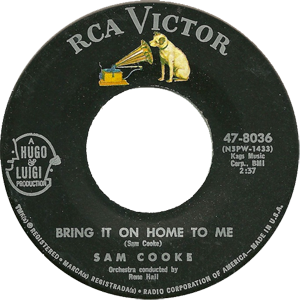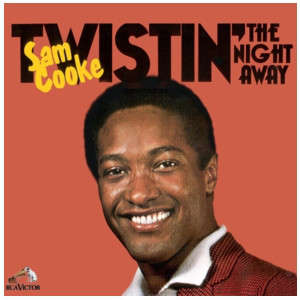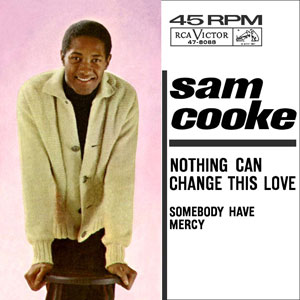
"Wonderful World" is a song by American singer-songwriter Sam Cooke. Released on April 14, 1960, by Keen Records, it had been recorded during an impromptu session the previous year in March 1959, at Sam Cooke's last recording session at Keen. He signed with RCA Victor in 1960 and "Wonderful World", then unreleased, was issued as a single in competition. The song was mainly composed by songwriting team Lou Adler and Herb Alpert, but Cooke revised the lyrics to mention the subject of education more.

"You Send Me" is a song written and originally recorded by American singer Sam Cooke, released as a single in 1957 by Keen Records. Produced by Bumps Blackwell and arranged and conducted by René Hall. The song, Cooke's debut single, was a massive commercial success, becoming a No. 1 hit on both Billboard's Rhythm & Blues Records chart and the Billboard Hot 100.

"Bring It On Home to Me" is a song by American soul singer Sam Cooke, released on May 8, 1962, by RCA Victor. Produced by Hugo & Luigi, and arranged and conducted by René Hall, the song was the B-side to "Having a Party". The song peaked at number two on Billboard's Hot R&B Sides chart, and also charted at number 13 on the Billboard Hot 100. The song has become a pop standard, covered by numerous artists of different genres. It is one of The Rock and Roll Hall of Fame's 500 Songs that Shaped Rock and Roll.

"Twistin' the Night Away" is a song written and recorded by Sam Cooke. It was recorded on 18 December 1961 and released as a single in 1962. It became very popular, charting in the top ten of both the Billboard Hot 100 (#9) and Billboard's R&B chart (#1). "Twistin' the Night Away" was successful overseas as well, peaking at #6 on the UK Singles Chart.

"Chain Gang" is a song by American singer-songwriter Sam Cooke, released as a single on July 26, 1960.
"You're Nobody till Somebody Loves You" is a popular song written by Russ Morgan, Larry Stock, and James Cavanaugh and published in 1944. The song was first recorded by Morgan and was a hit for him in 1946, reaching the No. 14 spot in the charts. The best known version was Dean Martin's, which was released in 1960 and reissued in 1964.

"Another Saturday Night" is a 1963 hit single by Sam Cooke from the album Ain't That Good News. The song was written by Cooke while touring in England when staying in a hotel where no female guests were allowed. It reached No. 10 on the Billboard Hot 100 and was No. 1 on the R&B chart for a single week. In the UK, the song peaked at No. 23 on the UK Singles Chart.
"Good Times" is a song written and recorded by Sam Cooke, released as single in 1964.

"I'll Come Running Back to You" is a song written and recorded by American singer-songwriter Sam Cooke, released November 18, 1957, by Specialty Records. The songwriting credit was attributed to "S. Cook" by the label. The song was a number one hit on Billboard's Hot R&B Sides chart, and also peaked at No. 18 on the Billboard Hot 100.

"Cupid" is a song by American singer Sam Cooke, released on May 16, 1961. It charted at number 17 on the Billboard Hot 100 and number 20 on the Hot R&B Sides chart; the track performed best in the United Kingdom, peaking at number seven on the UK Singles Chart. The song is featured on Cooke's greatest hits album, The Best of Sam Cooke (1962). Cooke's producers had asked him to write a song for a girl they had seen on a Perry Como TV show—but once they heard her sing, they kept "Cupid" for Cooke himself.
"There! I've Said It Again" is a popular song written and published by Redd Evans and David Mann in 1941. In early 1945, Vaughn Monroe and his Orchestra released Victor 20-1637, which reached the number one position on the Billboard's National Radio Airplay chart for five straight weeks, then no.2 for six more weeks, and a total run of 29 weeks. It finished 1945 as the no. 4 record of the year.

"Lookin' for a Love" is a song written by J. W. Alexander and Zelda Samuels and was the debut hit of the family group the Valentinos, which featured Bobby Womack. The song was a hit for the Valentinos, climbing to number eight on the R&B chart and crossing over to number 72 on the Billboard Hot 100 in 1962, released on Sam Cooke's SAR label. The song became a much bigger hit when Womack issued a solo version in 1974; this version reached number one on the R&B chart and number ten on the Billboard Hot 100. As well, an interim version of "Lookin' for a Love" by the J. Geils Band in 1971 was a top-40 hit for them, peaking at number 39.
"Sweet Soul Music" is a soul song first released by American singer Arthur Conley in March 1967. Written by Conley and Otis Redding, it is based on the Sam Cooke song "Yeah Man" from his posthumous album Shake; the opening riff is a quote from Elmer Bernstein's score for the 1960 movie The Magnificent Seven.

"Everybody Loves to Cha Cha Cha" is a song by American singer-songwriter Sam Cooke, released in January 1959. The song was one of Cooke's biggest successes on Billboard's Hot R&B Sides chart, peaking at number two; the song also charted at number 31 on the Billboard Hot 100.

"Only Sixteen" is a song by American singer-songwriter Sam Cooke, released in May 1959. It was a top 15 hit on Billboard's Hot R&B Sides chart and also charted within the top 30 of the Billboard Hot 100 and the UK Singles Chart. In the UK it was covered, and taken to No. 1, by Craig Douglas.
"Sad Mood" is a song by American singer-songwriter Sam Cooke, released on November 8, 1960 by RCA Victor. Arranged and conducted by Sammy Lowe, the song charted within the top 30 of Billboard's Hot R&B Sides chart and the Billboard Hot 100.

"Having a Party" is a song by American singer-songwriter Sam Cooke, released on May 8, 1962, by RCA Victor. Produced by Hugo & Luigi and arranged and conducted by René Hall, the song was the A-side to "Bring It On Home to Me". The song peaked at number four on Billboard's Hot R&B Sides chart, and also charted at number 17 on the Billboard Hot 100.

"Nothing Can Change This Love" is a song by American singer-songwriter Sam Cooke. It was released as a single on September 11, 1962 by RCA Victor. The song peaked at No. 2 on Billboard's Hot R&B Singles chart, and also charted at No. 12 on the Hot 100. The song later got on the album Mr. Soul.
"That's It—I Quit—I'm Movin' On" is a song recorded by American singer Sam Cooke, released on February 14, 1961 by RCA Victor. Produced by Hugo & Luigi and arranged and conducted by Sammy Lowe, the song was a top 30 hit on Billboard's Hot R&B Sides chart and the Billboard Hot 100.

"Lonely Island" is a song by American singer-songwriter Sam Cooke, released on March 24, 1958 by Keen Records. The song peaked at number 10 on Billboard's Hot R&B Sides chart, and also charted within the top 30 of the Billboard Hot 100.














